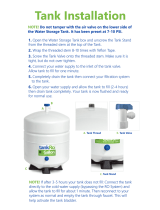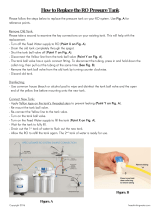
START-UP PROCEDURE
2) GAC and Carbon Block:Designed to remove chlorine
form the water supply, as well as organic and inorganic
substance before entering the TFC membrane (average
1) Check to see all connections are made.
2) Check that the pre-filter and pre-carbon sumps are
secure using the housing wrench provided.
3) Slowly turn on the water by turning the needle valve
counterclockwise.
4) The valve handle on top of the tank should be in the
open position, parallel to the valve body.
5) The handle of the faucet should be perpendicular to the
spigot (closed).
6) Check for leaks.
7) The RO-5/50 drinking water system makes 2 gallons of
drinking water per hour and requires 1 to 2 hours before
water is readily available.
8) During this initial fill period, you will hear water being
discharged through the black drain line. This is normal as
the contaminated water is being rejected by the reverse
osmosis membrane.
DO NOT DRINK THE WATER FROM THE
FIRST TANK PRODUCED BY THE SYSTEM.
DISCHARGE THE WATER FROM THE
STORAGE TANK BY OPENING THE
FAUCET. DISCHARGING MIGHT TAKE UP
TO 15 MINUTES.
If you have any difficulties with the installation, or
require additional information on your unit, please
consult with our factory technicians.
We thank you for purchasing our RO-5/50P
Reverse Osmosis unit. Your high quality
processed drinking water. In order to maintain
this high quality water, it is important that
scheduled maintenance be followed.
RECOMMENDED MAINTENANCE
1) Sediment Pre-filter: The pre-filter protects the
system and should be maintained regularly, a clear
housing has been provided for your convenience.
The show-white pre-Filter should be changed when
the outside discolors to a cardboard brown color and
before the inner surface discolors. The life of the pre-
filter will depend upon the condition of your water
supply and should be checked at 3-month intervals
until a filter life is established (average life 6 months).
life 12 months).
3)Post-Carbon: The post-filter should be changed when
you experience an unusual taste and/or odor to the water
and has a nominal life of 1 year.
4)Membrane: The high quality Thin Film Composite
membrane should last between 2 to 4 years depending on
the quality of your local water.
5) Drain your storage tank twice each month to extend the
membrane and have the freshest water in the storage
tank. Drain the storage tank by lifting the faucet handle
into the parallel position with the spigot until water flow
stops from the tank. Return the faucet handle to the closed
position and the tank will refill in 2 hours. It is best to drain
the system before retiring for the evening.
CHANGING THE SEDIMENT, GAC, AND CARBON
BLOCK PRE-CARBON BLOCK PRE-FILTERS
CAUTION: ANY REPLACEMENT FILTERS
OR MEMBRANE NOT RECOMMENDED BY
THE FACTORY CAN CAUSE SEVERE
DAMAGE TO THE SYSTEM AND VOIDS ALL
WARRANTIES.
1) Shut off the feed water to the system by turning the
saddle valve on the water supply adapter clockwise until it
stops.
2) Close the storage tank ball valve by turning the handle
perpendicular to the valve body.
3) Press down on faucet handle to relive pressure.
4) Allow 3-5 minutes for pressure in the system to drop.
5) Remove the filter sumps with the housing wrench by
turning the sump to the left (counterclockwise). If the O-
ring in the sump is stretched or worn, it should be replaced
to maintain a proper seal.
6) Remove the old filter and gaskets (if any) and insert the
new filter.
8) Replace the sump onto the cap by turning it to the right
(clockwise) until the O-ring makes firm contact, like an oil
filter on a car. DO NOT OVER-TIGHTEN.
8) Turn on the feed water to the system by turning the
saddle valve at the water supply adapter counter-
clockwise.
9) Turn the storage tank ball valve handle parallel to the
valve body.









